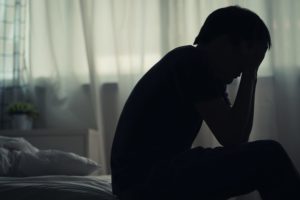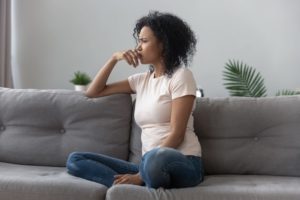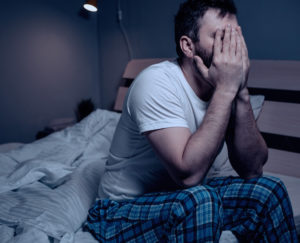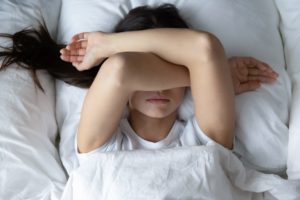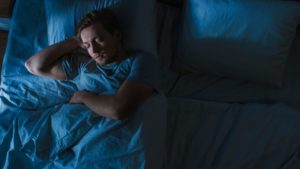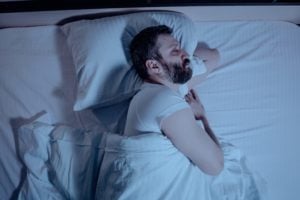Can Depression Cause Sleep Talking?
If you or someone you know is in crisis, dial 988 to reach the Suicide and Crisis Lifeline, which provides 24/7, free, and confidential support.
Sleep talking is a common and often normal behavior . Sleep talking may also be called somniloquy or be referred to as a type of parasomnia . Often, sleep talking occurs for no apparent reason, but sometimes it is related to an underlying illness or disorder. We explore why you might be sleep talking, whether depression can cause sleep talking, and when to see a doctor.
Is Your Troubled Sleep a Health Risk?
A variety of issues can cause problems sleeping. Answer three questions to understand if it’s a concern you should worry about.
Why Am I Talking in My Sleep?
People may talk while they are asleep for different reasons . One theory is that people sleep talk as a way of replaying recently formed memories . Sleep talking can occur during any sleep stage.
Because sleep talking is common and doesn’t usually negatively affect the sleeper, the behavior is often considered normal. Sleep talking hasn’t been widely studied, so experts don’t fully understand what causes it. Normal sleep talking often involves a sleeper only saying a word or short phrase while they are lying down and otherwise appear to be asleep.
Sometimes, people sleep talk because they have a type of sleep disorder called a disorder of arousal. In these cases, a person does more than just talk while they are asleep. In addition to sleep talking, they may scream and have a sleep terror, stand up and sleepwalk, or engage in other types of movements or behaviors.
Sleep talking has also been associated with sleep apnea , periodic limb movements of sleep, and post-traumatic stress disorder (PTSD) . When sleep talking occurs along with movements in the context of rapid eye movement sleep behavior disorder (RBD), it sometimes foreshadows a future diagnosis of Lewy body dementia or Parkinson’s disease.
How Common Is Sleep Talking?
Research suggests that about 66% of people sleep talk at some point in their lives, and 17% of people have talked in their sleep within the past 3 months. Sleep talking is more common in people who also have certain other sleep conditions, such as sleepwalking. There doesn’t appear to be any difference in sleep talking prevalence across genders.
When a person sleep talks, they may pause and speak with the timing a person would have in a regular conversation. However, they are asleep and generally do not remember the sleep talking episode upon waking.
Sleep talking is not usually considered problematic in and of itself, unless it bothers a bed partner or brings up uncomfortable conversation topics. Sleep talking and topics of conversation may be coherent or incoherent, with words that may not connect to reality.
Is Sleep Talking a Sign of a Mental Illness?
Sleep talking is viewed as normal in most cases, and it isn’t considered a symptom or diagnostic criterion for any mental illnesses, including depression . Most people who sleep talk do not have a mental illness. That said, people with mental health disorders are twice as likely to sleep talk.
Sleep talking often occurs in the context of disrupted sleep. Since mental health conditions often affect sleep, they may inadvertently serve as a trigger for sleep talking and other sleep behaviors . For example, someone with depression may experience an early period of REM sleep, and fragmented REM sleep may predispose toward sleep talking. In particular, although it’s not an official diagnostic symptom , people who live with post-traumatic stress disorder (PTSD) commonly experience sleep talking. Sleep problems including sleep talking are also common in people with bipolar disorder.
Less research has been done on depression and sleep talking. There is some evidence that sleep talking is linked to lower subjective sleep quality and altered sleep architecture, or the time spent in different sleep stages. Depression also often involves changes in sleep architecture , but not the same changes as those seen in sleep talking. Older studies have linked taking antidepressants to experiencing parasomnias , which are sleep behaviors that may include sleep talking. REM sleep behavior disorder may occur more often in someone who is taking an antidepressant. It is unclear if this is simply unmasking a predisposition or present because it is provoked by the medication.
Those who believe their sleep talking may stem from mental health concerns should seek professional help.
How Are Mental Health Conditions Diagnosed?
If you think you may have depression or another mental health condition, see a mental health professional. Generally, medical professionals begin the diagnostic process by taking your history . They may ask what physical and emotional symptoms you have and how they have fluctuated over time. If they determine you have a mental health disorder, they may prescribe therapy or medication to treat it.
Along with classic symptoms like low mood and changes in appetite , depression can also make it difficult to fall asleep or sleep through the night with early morning awakenings. Your doctor can recommend sleep hygiene tips or cognitive behavioral therapy for insomnia (CBTI) to sleep more soundly. As your sleep improves, you may find you sleep talk less.
Medical Disclaimer: The content on this page should not be taken as medical advice or used as a recommendation for any specific treatment or medication. Always consult your doctor before taking a new medication or changing your current treatment.

Still have questions? Ask our community!
Join our Sleep Care Community — a trusted hub of sleep health professionals, product specialists, and people just like you. Whether you need expert sleep advice for your insomnia or you’re searching for the perfect mattress, we’ve got you covered. Get personalized guidance from the experts who know sleep best.
References
15 Sources
-
American Academy of Sleep Medicine. (2014). The International Classification of Sleep Disorders – Third Edition (ICSD-3). Darien, IL.
https://aasm.org -
Bollu P. C., Goyal M. K., Thakkar M. M., Sahota P. Sleep Medicine: Parasomnias. Mo Med. 2018 Mar-Apr;115(2):169-175.
https://pubmed.ncbi.nlm.nih.gov/30228711/ -
Alfonsi V, D’Atri A, Scarpelli S, Mangiaruga A, De Gennaro L. Sleep talking: A viable access to mental processes during sleep. Sleep Med Rev. 2019 Apr;44:12-22.
https://pubmed.ncbi.nlm.nih.gov/30594004/ -
Vaughn, B. V. (2024, June 11). Approach to abnormal movements and behaviors during sleep. UpToDate.
https://www.uptodate.com/contents/approach-to-abnormal-movements-and-behaviors-during-sleep -
Camaioni M., Scarpelli S., Alfonsi V., Gorgoni M., De Bartolo M., Calzolari R., De Gennaro L. The Influence of Sleep Talking on Nocturnal Sleep and Sleep-Dependent Cognitive Processes. J Clin Med. 2022 Nov 1;11(21):6489.
https://pubmed.ncbi.nlm.nih.gov/36362716/ -
Arnulf I., Uguccioni G., Gay F., Baldayrou E., Golmard JL., Gayraud F., Devevey A. What Does the Sleeping Brain Say? Syntax and Semantics of Sleep Talking in Healthy Subjects and in Parasomnia Patients. Sleep. 2017 Nov 1;40(11).
https://pubmed.ncbi.nlm.nih.gov/29029239/ -
Koffel E., Khawaja I. S., Germain A. Sleep Disturbances in Posttraumatic Stress Disorder: Updated Review and Implications for Treatment. Psychiatr Ann. 2016 Mar;46(3):173-176.
https://pubmed.ncbi.nlm.nih.gov/27773950/ -
DSM-5-TR diagnostic criteria for a major depressive episode. UpToDate.
https://www.uptodate.com/contents/image?imageKey=PSYCH/89994 -
Steardo L. Jr, de Filippis R., Carbone E. A., Segura-Garcia C., Verkhratsky A., De Fazio P. Sleep Disturbance in Bipolar Disorder: Neuroglia and Circadian Rhythms. Front Psychiatry. 2019 Jul 18;10:501. Accessed on August 17, 2024.
https://pubmed.ncbi.nlm.nih.gov/31379620/ -
Center for Substance Abuse Treatment (US). Trauma-Informed Care in Behavioral Health Services. Rockville (MD): Substance Abuse and Mental Health Services Administration (US); 2014. (Treatment Improvement Protocol (TIP) Series, No. 57.) Exhibit 1.3-4, DSM-5 Diagnostic Criteria for PTSD.
https://www.ncbi.nlm.nih.gov/books/NBK207191/box/part1_ch3.box16/ -
Krishnan, R. (2024, April 12). Unipolar depression: Neurobiology. UpToDate.
https://www.uptodate.com/contents/unipolar-depression-neurobiology -
Kierlin L., Littner M. R. Parasomnias and antidepressant therapy: a review of the literature. Front Psychiatry. 2011 Dec 12;2:71.
https://pubmed.ncbi.nlm.nih.gov/22180745/ -
Lyness, J. M., Gaynes, B. E. (2024, August 23). Approach to the adult patient with suspected depression. UpToDate.
https://www.uptodate.com/contents/unipolar-depression-in-adults-assessment-and-diagnosis -
Mental Disorders. MedlinePlus
https://medlineplus.gov/mentaldisorders.html -
Coryell, W. (2023, November). Depression. MSD Manual Consumer Version.
https://www.msdmanuals.com/home/mental-health-disorders/mood-disorders/depression#Symptoms_v747865




